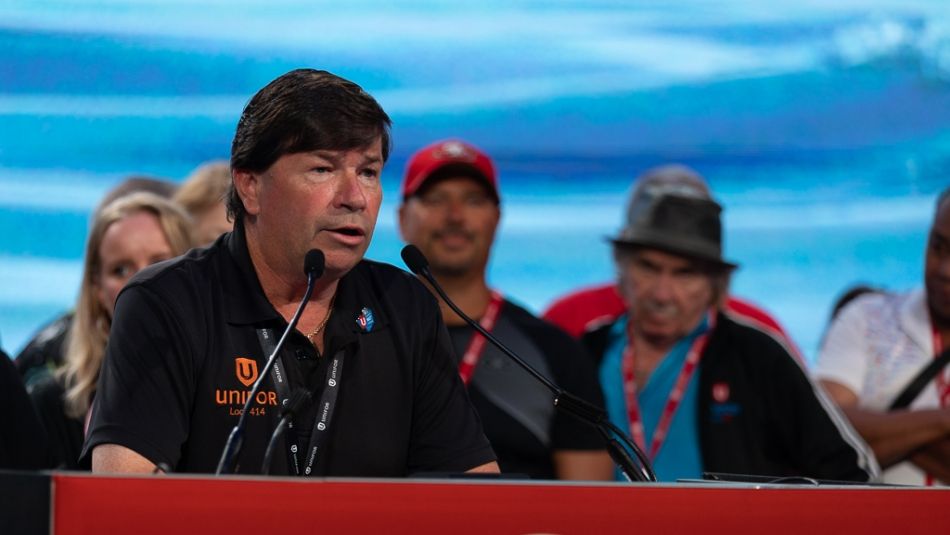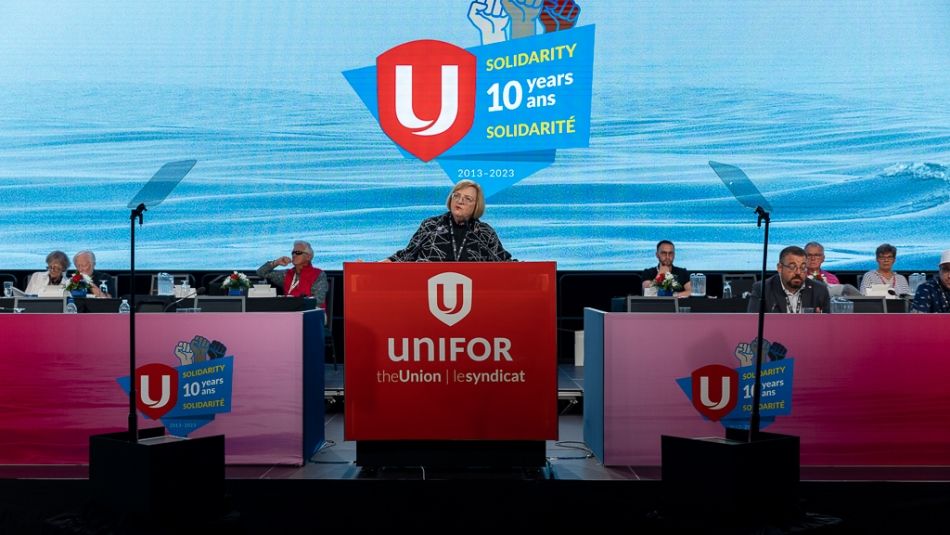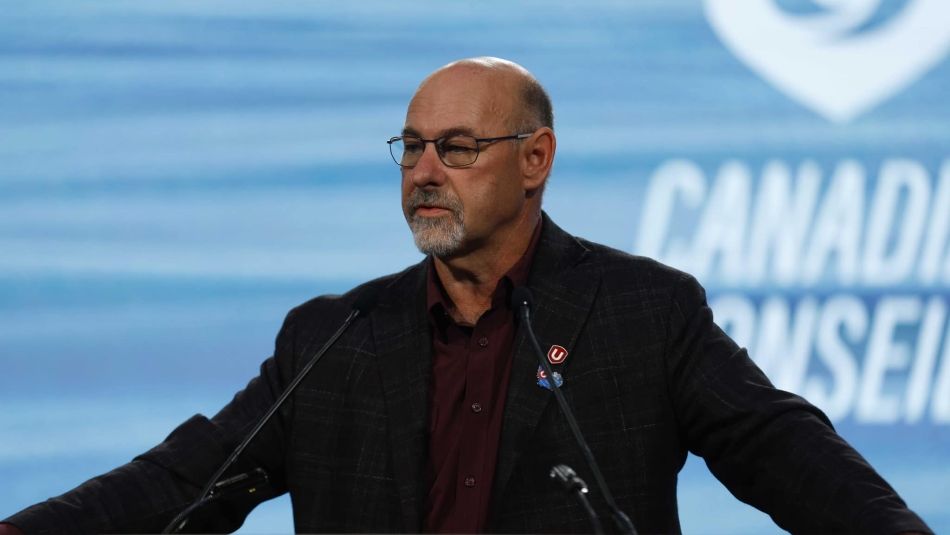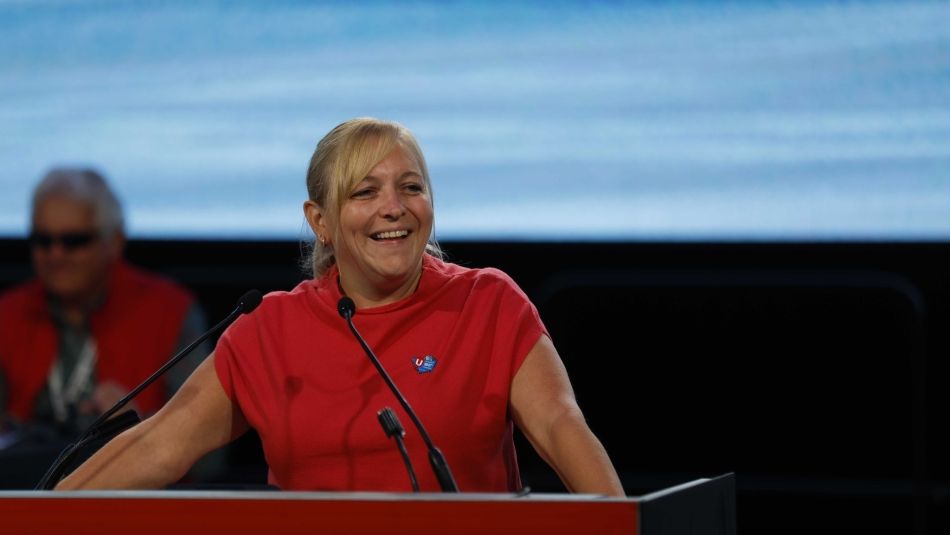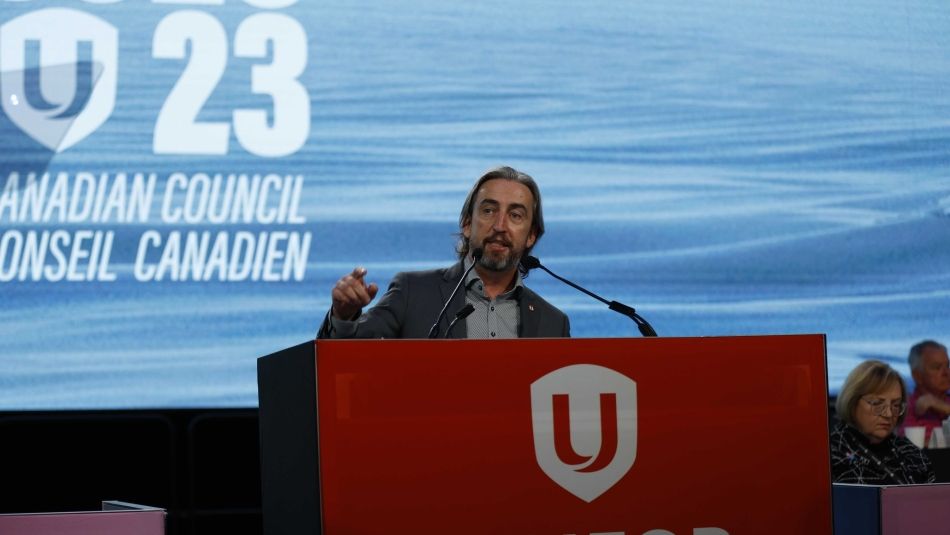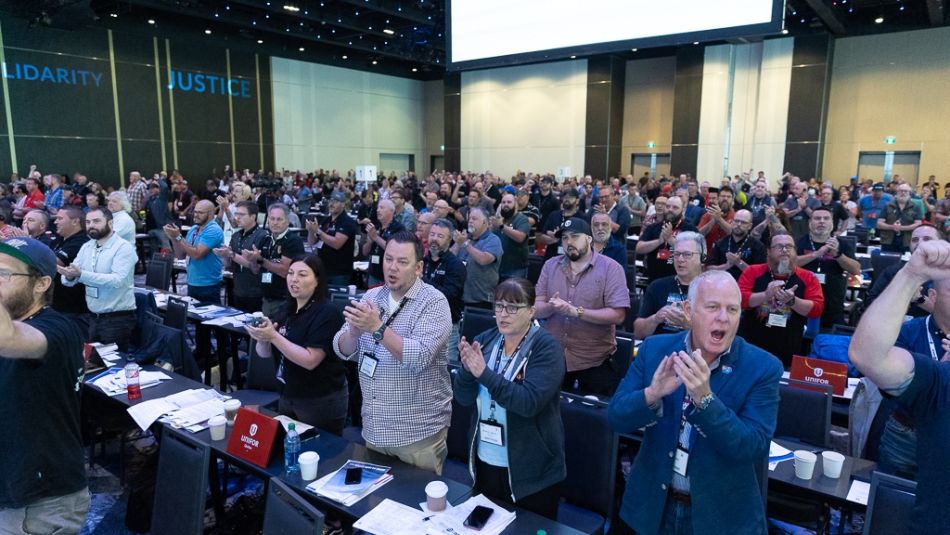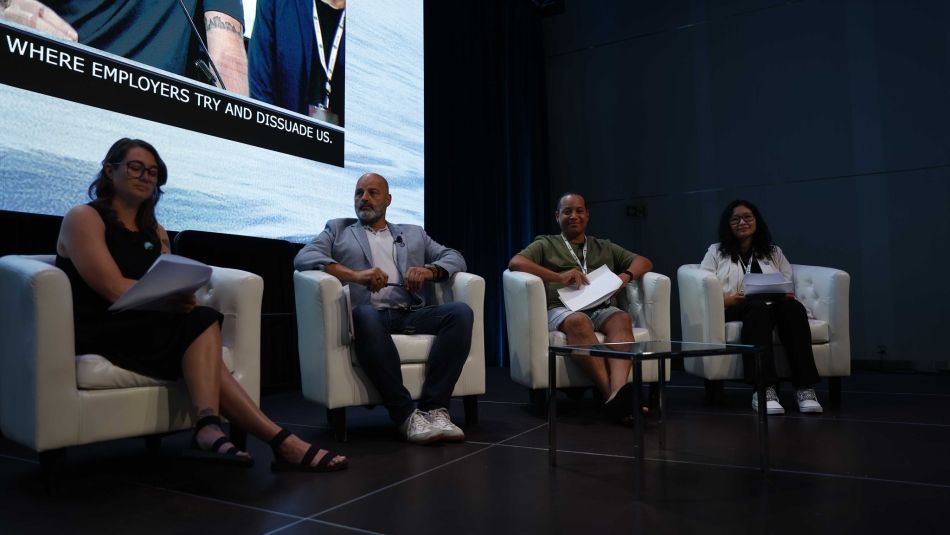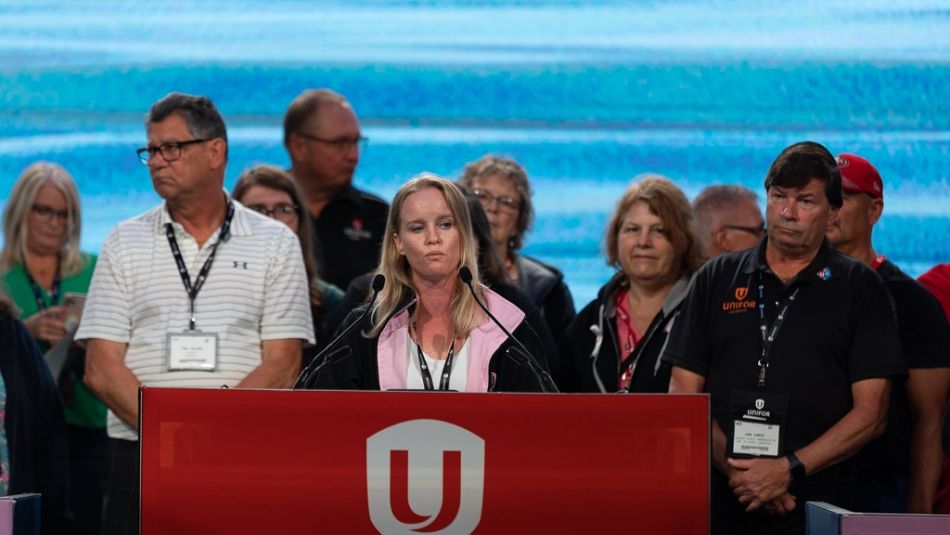
Share
The second day of Unifor’s Canadian Council recognized striking and locked-out workers from Windsor Salt in Ontario, Les Autobus Venise in Quebec, Metro grocery stores in Greater Toronto Area, and Salvation Army workers in Langley, B.C.
Gord Currie, the President of Local 414, representing the grocery workers at Metro’s 27 picket lines, told delegates it was the $2/hr pandemic pay bonus that sparked the dispute between 3,700 Unifor members and the grocery giant.
“Some would call it hero pay and I said, ‘That’s when I’m going to have a problem…when [the company] takes it back,’” he said. “We’re going to keep fighting and we’re going to win. I know when I get back home, that this thing is going to escalate…We’re going to bring these guys down.”
Local 240 President Jodi Nesbitt, who represents striking Windsor Salt members on strike since February, alongside fellow members from Local 1959, said there has been a strong solidarity on the line.
“Our members have been doing this, day in, day out, week after week and with a smile on their face,” Nesbitt said. “That determination is from the solidarity that comes from our community and labour councils. I want to recognize all the donations we have gotten from across Canada.”
The national union said it would provide an additional $50,000 to help the striking workers, with individual delegates and locals from across the country continuing to add to that amount during Council.
In his address to the crowd, Unifor National Secretary-Treasurer Len Poirier reflected on the amazing things Unifor members do across the country in all major areas of the country’s economy.
Poirier and other leaders got to experience life in members’ workplaces, including experiencing the Suncor oil sands in -40C and touring basements of some of the oldest hotels in Canada. He had the opportunity to sit behind the anchor desk in the at NTV in Newfoundland and meet hospitality workers at the C.N. Tower restaurant in Toronto.
“Going into the workplaces and meeting the rank-and-file members in their elements where they have the comfort and ability to speak what’s on their mind, is a great experience for us,” he told delegates.
Poirier emphasized the importance and continued commitment Unifor has for supporting strikes, as well as the union’s Social Justice Fund.
Next up, Dave Churchill from Local 28 and co-chair of the Health and Safety Policy committee at Bell Technical Solutions was announced as this year’s Bud Jimmerfield Award recipient.
Atlantic Regional Director Jennifer Murray gave props to FFAW-Unifor president Greg Pretty, in her speech, and his team of members who stood up to greed and won a fair price for crab by tying up the fishing boats and halting the crab fishery for six weeks, the largest tie up in the history of the union.
“FFAW-Unifor won that fight and they have proven that they won’t back down, that they deserve to be respected and paid fairly, and that greed and disrespect cannot and will not win,” she said. “And that nobody better mess with this bunch.”
Murray said, inch-by-inch, the union is pushing against strong and entrenched systems that favour the rich and powerful. Every day, members are pushing back on the greed of many employers and ignorance of many politicians.
She zeroed in on the Blaine Higgs government focusing on Policy 713, which sets the minimum requirements of using preferred pronouns and having at least one gender neutral bathroom in schools, as a distraction from the ongoing health care and affordability crisis happening in New Brunswick.
Murray also lifted the Humanity Project in Moncton, which aims to provide shelter, food and help those struggling through addiction. She championed ending the stigma of mental health issues and vowed to fight alongside low-paid grocery workers gearing up for a battle with Loblaw Dominion in Newfoundland and Labrador.
She promoted the importance of partnerships between trade schools and employers – such as with MWF Local 1 at the Halifax Shipyard and their Pathways to Shipbuilding program – to support workers and help them secure good, family-supporting, union jobs.
Earlier this month, the federal government announced a $463 million investment to help prepare the Halifax shipyard to produce 15 of the “most modern destroyers the world has ever seen,” Murray said, which will be built between next year and 2050.
“By creating a secure path from education to employment, with mentorship at every stage, we have grown the pool of Skilled Trades workers in Nova Scotia and, importantly, we have changed lives,” she said. “This, my friends, is what we are building.”
In his speech, Western Regional Direct Gavin McGarrigle thanked the brave volunteers who are helping out with wildfires in Canada.
“We heard in the past few days about the wildfires affecting Yellowknife, Kelowna and many parts of B.C., the crisis is urgent. Right now, as we speak, entire communities are not only burning, but they will suffer long term harm,” said McGarrigle.
He said he joined Unifor’s National Executive Board in Ottawa in November, calling on the federal government to address corporate gouging, to fix Employment Insurance, to bring workers voices to industrial policy changes and to finally bring in anti-scab legislation.
McGarrigle said he is looking forward to providing support and solidarity to the ongoing organizing campaign of Amazon warehouse workers in B.C., which began in June. He also talked about SaskTel’s erosion of jobs by slow and steady contracting out of work in Saskatchewan.
The director then took aim at Manitoba Premier Heather Stefanson, fiercely demanding her government take action in light of the murder charges of four Indigenous women at the hands of an alleged serial killer in Manitoba, fueled by racism.
“Sit down with the families, bring in the experts, work with the federal government and municipalities, stop the bloody excuses and search the damn landfill,” he said.
Delegates elected Samia Hashi as Unifor’s new Ontario Regional Director.
“Thank you so much for believing in me and believing I can do this work,” she said. “I may look young, but I have the passion and drive. I promise you I have your back and please don’t forget the connection we have. Just know that I’ll be there.”
Three National President’s Recommendations – Building an Economy that Leaves No Worker Behind, Bargaining Workers’ Power and Organizing New Members – were passed at Canadian Council.
The Supporting 2SLGBTQIA+ Workers recommendation unanimously passed the day before.
A number of resolutions were adopted, including supporting journalists and protecting them for online harassment, stop contracting out SaskTel, defending universal health care benefits under attack and paid and protected leave in the event of a miscarriage.
The last event of the day was a panel celebrating 10 years of organizing victories introduced by Unifor Organizing Director Justin Gniposky and Quebec Local Director Renaud Plante and moderated by Gabrielle Ross-Marquette.
Last month, more than 700 workers at the Original Cakerie in London, Ont., joined Unifor in a huge organizing campaign win.
“It definitely takes time, you want things to work out and achieve every milestone, but you don’t want to rush,” said Trey Wilson, team lead at that workplace. “How can I make sure my co-workers respond well to this next step? You have to build trust and once the trust is there, it’s good.”
Areewan McLeod, dealer at the Cascades Casino Delta in Delta, B.C. and a member of Local 114, said when her workplace joined Unifor, her workplace suddenly “had each other’s backs.”
André Hachey, National Representative in the Organizing Department living and working in Quebec, spoke about his experience organizing workers.
“People don’t want to talk to a union because they’re afraid,” he said.
“They’re afraid of what their employers are going to say and do. We tried to have an open campaign and the employers sent people in pickup trucks to intimidate them, so we ended up knocking on doors. The more people who join unions, the more employers are afraid of us.”
Check out the Facebook photo album from Canadian Council Day 2


